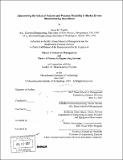| dc.contributor.advisor | Nelson Repenning and Chris Magee. | en_US |
| dc.contributor.author | Trujillo, Jason M | en_US |
| dc.contributor.other | Leaders for Manufacturing Program. | en_US |
| dc.date.accessioned | 2007-12-07T16:08:23Z | |
| dc.date.available | 2007-12-07T16:08:23Z | |
| dc.date.copyright | 2007 | en_US |
| dc.date.issued | 2007 | en_US |
| dc.identifier.uri | http://hdl.handle.net/1721.1/39696 | |
| dc.description | Thesis (S.M.)--Massachusetts Institute of Technology, Sloan School of Management; and, (S.M.)--Massachusetts Institute of Technology, Engineering Systems Division; in conjunction with the Leaders for Manufacturing Program at MIT, 2007. | en_US |
| dc.description | Includes bibliographical references (p. 65-67). | en_US |
| dc.description.abstract | Manufacturing flexibility is wide field of research that lacks a clear and concise definition. It has been described by some to be a source of competitive advantage. Others have described manufacturing flexibility as analogous to quality as a critical measure of manufacturing capability. This thesis considers the role of manufacturing flexibility as it applies to a manufacture of luxury products. A specific definition of flexibility is applied to this firm based on its particular industrial evolutionary stage and operational objectives. Probabilistic modeling, linear optimization and iterative simulation is used to show that volume and product mix flexibility can substantially improve the ability to respond to customer demands while improving capacity utilization. Network flow modeling illustrates that significant benefits can be achieved with limited flexibility. The full benefits of this flexibility are detailed and the organizational barriers to change are explored. | en_US |
| dc.description.statementofresponsibility | by Jason M. Trujillo. | en_US |
| dc.format.extent | 67 p. | en_US |
| dc.language.iso | eng | en_US |
| dc.publisher | Massachusetts Institute of Technology | en_US |
| dc.rights | M.I.T. theses are protected by copyright. They may be viewed from this source for any purpose, but reproduction or distribution in any format is prohibited without written permission. See provided URL for inquiries about permission. | en_US |
| dc.rights.uri | http://dspace.mit.edu/handle/1721.1/7582 | |
| dc.subject | Sloan School of Management. | en_US |
| dc.subject | Engineering Systems Division. | en_US |
| dc.subject | Leaders for Manufacturing Program. | en_US |
| dc.title | Determining the value of volume and process flexibility in market driven manufacturing operations | en_US |
| dc.type | Thesis | en_US |
| dc.description.degree | S.M. | en_US |
| dc.contributor.department | Leaders for Manufacturing Program at MIT | en_US |
| dc.contributor.department | Massachusetts Institute of Technology. Engineering Systems Division | |
| dc.contributor.department | Sloan School of Management | |
| dc.identifier.oclc | 176093570 | en_US |
